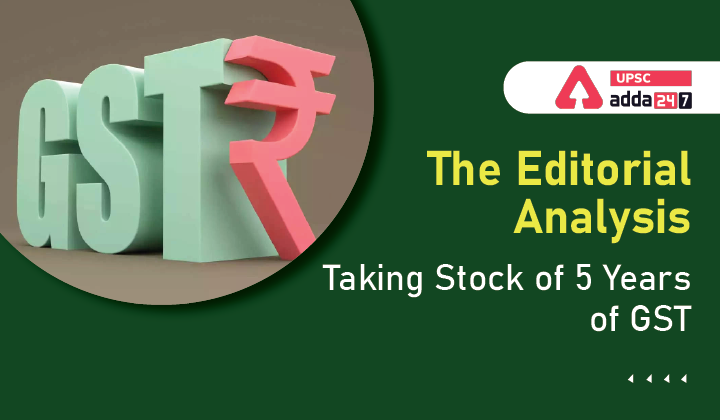Table of Contents
GST UPSC: Relevance
- GS 3: Indian Economy and issues relating to planning, mobilization, of resources, growth, development and employment.
GST news: Context
- Recently, Goods and Services Tax (GST) has completed five years in existence. On the completion of GST’s five years, it makes sense to ask what happened to inflation.
Inflation in India
- During the 12 months preceding GST implementation, the Consumer Price Index (CPI) inflation was 3.66%, while it increased to 4.24% post-GST in the next 12 months.
- However, India is not alone in witnessing higher inflation. A similar pattern was observed in Australia, New Zealand, and Canada.
Impact of GST on inflation
- In theory, implementing GST should not lead to a change in overall inflation.
- The revenue-neutral rate (RNR) is calculated so that it would not cause higher inflation. But revenue neutrality does not mean that prices would not go up or down in the economy.
- In a report published in 2017, RBI showed that about half of the groups of items that GST covers are not in the CPI basket. So, the effect of GST on prices was expected to be small.
GST induced inflation
- The actual CPI growth in the study period is 4.61%, whereas the counterfactual estimate of inflation is 3.24%. This implies that without the GST implementation, the CPI inflation would have been 3.24%.
- CPI core inflation increased by 1.04pp in the post-GST period (actual inflation was 4.57%, counterfactual inflation was 3.53%).
- GST is found to have a significant positive impact on inflation of commodity groups such as paan, tobacco and intoxicants, clothing and footwear, housing, and miscellaneous sectors (mainly consisting of services).
- In the case of non-exempted food and beverages, implementation of GST is found to have a negative impact of 4.42% on price levels.
Rise in inflation after GST
- The rise in inflation post-GST implementation could be due to the rise in the tax rate of some goods and services, the inclusion of business activities that were not taxed earlier, or the market structure.
- Many firms have jumped to the tax net to take advantage of input tax credit and escape from the punishing reverse charge mechanism.
- Taking advantage of market power, it is possible that most firms would have passed the taxes to end consumers, resulting in a cost-push inflationary impact of the GST.
Conclusion
- GST implementation has resulted in a decrease in inflation of food items and raised inflation of non-food items such as CPI, paan, tobacco and intoxicants, clothing and footwear, housing, miscellaneous, and non-exempted food and beverages.
Read current affairs for UPSC





 TSPSC Group 1 Question Paper 2024, Downl...
TSPSC Group 1 Question Paper 2024, Downl...
 TSPSC Group 1 Answer key 2024 Out, Downl...
TSPSC Group 1 Answer key 2024 Out, Downl...
 UPSC Prelims 2024 Question Paper, Downlo...
UPSC Prelims 2024 Question Paper, Downlo...





